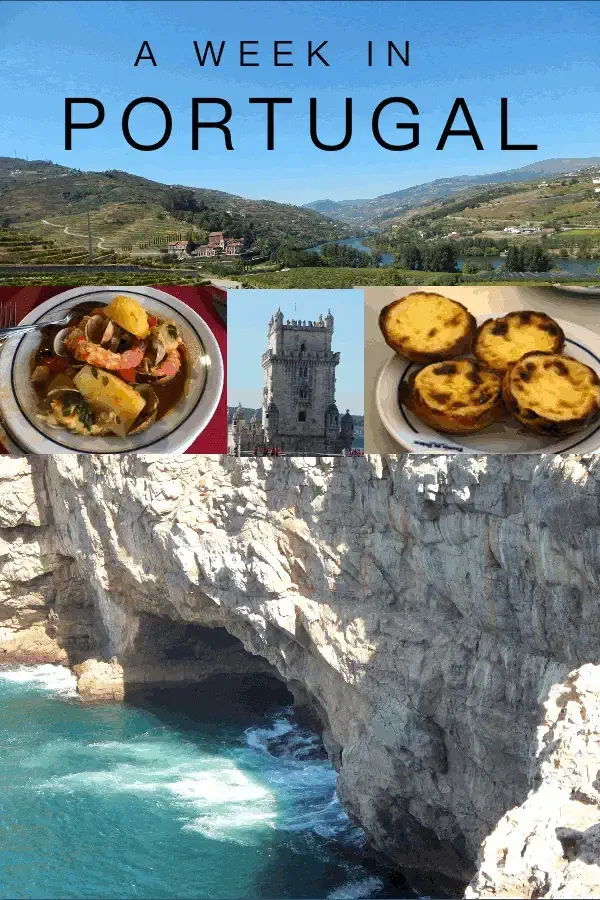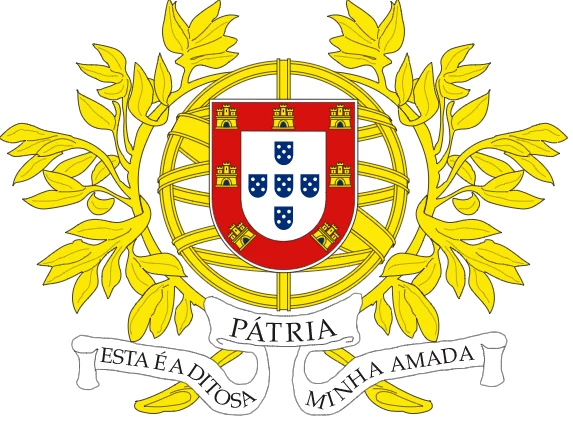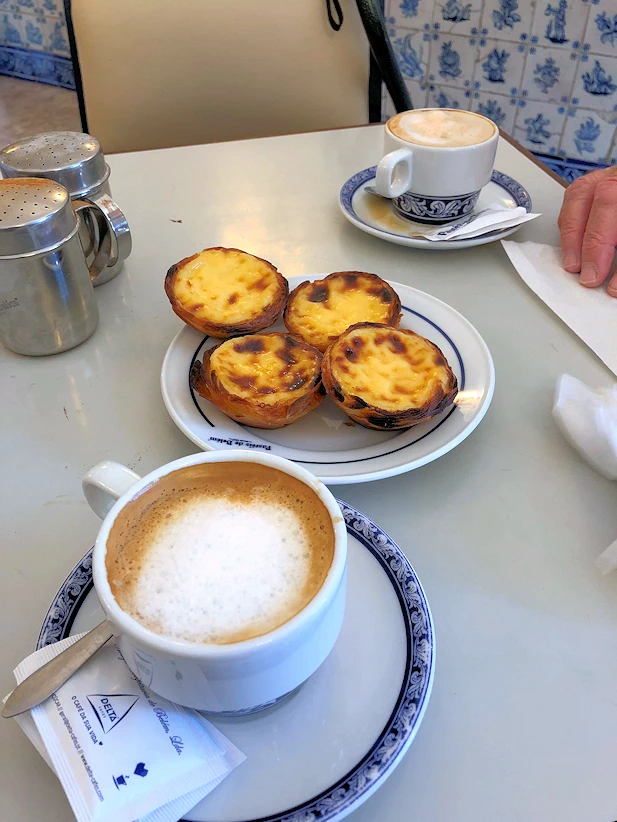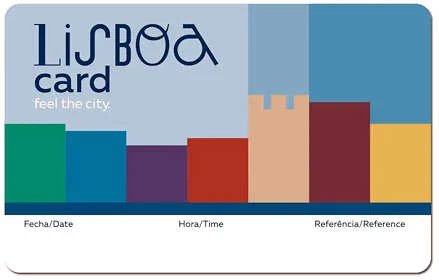by Celeste Lipford and Terry Lipford - last updated on 10/9/2025

In the grand finale of our European Adventure, we set our sights on Portugal, a country which neither of us had visited before. However, it held a unique significance for us, as my maternal grandparents had immigrated from Portugal to the United States before they met. My mother was the youngest of eleven children and as you can imagine we had quite a large extended family. My grandparents' home was the core of the family and the entire extended family would gather there often. Though I was young, the memories of food, laughter, music and dancing endure in my mind. Those days, a cherished part of my past, have been brought back to life through this exploration of Portugal, allowing me to savor those precious memories. As we walked around the city streets, I could close my eyes and hear my grandparents talking in Portuguese; the cadence and tone of the older people in the streets talking to each other was exactly as I remember my grandparents' lively discussions.
Our one week exploration of Portugal began in Porto, and then to the Douro wine region, a landscape adorned with terraced vineyards along the hillsides. Here, we immersed ourselves in the art of winemaking, sampled local vintages including the world famous port wine. From there we hit the beach Praia do Norte, in Nazaré in an attempt to see the big surf on our way to Lisbon.
Lisbon, the capital city, awaited us with its blend of old-world charm and modern vibrancy. Exploring historic neighborhoods like Belém and Baixa and the Praça do Comércio, we delved into the heart of Portuguese culture, indulging in pastéis de belem and seafood galore. The Portuguese have a myriad of ways to cook codfish, also known as 'bacalhau.’ No trip to Portugal is complete without sampling the bacalhau.
Our journey southward brought us to Portimão in the Algarve region, where Portugal's beaches and stunning rugged rock formations proved to be some of the best we've ever encountered—and we've explored numerous coastlines. The allure of the Algarve extends beyond its coastal beauty, reaching into its culinary offerings. From enjoying grilled sardines at beachside shacks to savoring the flavors of regional dishes like cataplana de peixe, the gastronomic experiences alone would make us revisit Portugal.
The map image below displays our route and destinations during our Portugal exploration, click any of the destinations in the list to be taken to that part of this page.

NOTE: This video is the property of Just Traveling Thru, LLC.
If you enjoy our videos click here to subscribe to our Youtube Channel.
Click the above video poster image to explore our "Portugal Reasons to Visit and Travel Vlog" - In this Portugal vacation travel video guide we'll provide reasons to visit and information about how to spend a week in Portugal. Portugal is a beautiful country directly on the Atlantic Ocean that offers a lot of value for your money and it has a fascinating history and culture. From the Douro River Valley to Nazare surf beach to the scenic and historic Lisbon and then south to the incredibly picturesque beaches of the Algarve Portugal has a lot to offer.
While Portugal ranks 19th in size among European countries, covering an area of 88,889 square kilometers, its diverse landscapes beckon exploration beyond major cities. With a width of 218 km and a length of 561 km, mainland Portugal boasts 832 km of Atlantic coast and shares a 1,215 km border with Spain. To truly experience the more remote and scenic locations, a rental car becomes essential.
However, for those planning to stay within major urban hubs, navigating Portugal without a car is entirely feasible. Efficient train and bus services link key cities such as Porto, Lisbon, and Lagos, and others providing an economical means of transportation. To explore available options and plan your journey, websites like Omio can be invaluable. Check out the bus and train options from Lisbon to Porto: Omio Lisbon to Porto.
If you are considering train travel in Portugal or Europe: You may want to consider acquiring the Omio travel app. Twenty-seven million monthly users already compare and book trains, buses, flights and ferries on their phones seamlessly in Europe and beyond.

Besides our Portugal motivations from our family's heritage, here are some other incredible reasons why we wanted to visit Portugal;
Perhaps now you can understand our enthusiasm for spending a week in Portugal, exploring it from North to South?
Our flight from Madrid arrived in Porto in the afternoon and, eager to reach our hotel in the Douro River Valley, we decided to skip exploring Porto on this trip. Visiting Porto and spending a few nights in the city is undoubtedly on our list for our next visit. The airport was modern and very clean, however our focus was on getting our rental car and getting onto the road to the Douro Valley. If you are interested in this airport, here is the link to their website.
NOTE: The Airport image is the property of Pedroshin via Wikipedia utilizing the Public Domain License.
We picked up our rental car from Auto Europe, fired up our navigation App, and proceeded to drive to the Delfim Douro Hotel - our first
stop in Portugal. The stunning views from the rooms and from the pool area were welcome after a long day of travel.
To view this beautiful drive, click here to view our Duoro River Valley page.
After leaving the Delfim Douro Hotel in the enchanting Douro River Valley, we made an impromptu decision to pause at Praia do Norte on our journey to Lisbon. Our inspiration stemmed from witnessing the awe-inspiring giant waves being surfed in the HBO documentary "100 Foot Wave".
To view this beautiful beach, click here to view our Praia do Norte page.
Praia do Norte image is the property of Otávio Nogueira via Wikimedia Commons
Entering the heart of Lisbon, our next destination unfolds with charming cobbled streets, a mosaic of culture, and an invitation to explore the vibrant soul of Portugal's capital city.
To view this fascinating city, click here to view our Lisbon page.
After exploring the vibrant streets of Lisbon, our journey led us southward to the Algarve—a region celebrated for its favorable weather and the allure of breathtaking beaches adorned with mesmerizing rock formations. Portimão served as our central hub for exploring this coastal gem. Don't miss the chance to venture to the most southwestern point in Europe—the dramatic cliffs of Cabo de São Vicente, perched on the southwest tip of the Algarve.
To view this amazing area, click here to view our Algarve page.
Portuguese Delicacies, particularly its seafood and pastries, are beyond comparison. While French pastries hold their own charm, the uniqueness and excellence of Portuguese pastries captured our taste buds in every district we explored throughout the country. Below, feast your eyes on images of some of the delectable delights we savored, including the iconic Pastel de Nata and the flavorful Cataplana de Peixe.

Pastéis de Nata - these are from Pasteis de Belém which is considered to make the best in Lisbon
Pastéis de nata—those golden, creamy custard tarts with their delicately crisp, flaky crust—are perhaps Portugal’s most iconic dessert. Their story begins in the 18th century at the Jerónimos Monastery in the Lisbon parish of Santa Maria de Belém. Catholic monks, having migrated from France, brought with them culinary traditions that blended perfectly with local ingredients. At the time, convents and monasteries used large quantities of egg whites to starch religious garments like nuns' habits, which meant they were left with an abundance of egg yolks. Resourceful and inventive, the monks began using those yolks to create pastries—thus contributing to the rich legacy of Portuguese sweets.
Following the Liberal Revolution of 1820 and the subsequent dissolution of religious orders, the monks began selling their pastéis de nata at a nearby sugar refinery to generate income. When the monastery officially closed in 1834, the secret recipe was sold to the refinery’s owners. In 1837, they opened the Fábrica de Pastéis de Belém, which remains in operation today—still run by descendants of the original founders, and still the only bakery allowed to call them Pastéis de Belém.
But the Portuguese pastry tradition doesn’t stop there.
Another time-honored treat that holds a special place in many Portuguese households is filhós (or filhos, depending on the region). These are rustic, deep-fried pastries, typically made during festive seasons like Christmas and Carnival. The dough is simple—flour, eggs, yeast, and sometimes orange zest or aguardente (a Portuguese brandy)—but the result is rich with nostalgia. Once fried to a golden brown, filhós are generously dusted with cinnamon sugar or drizzled with honey syrup.
Unlike the refined, café-ready pastel de nata, filhós are homemade, passed down through generations, and often prepared in big batches by families coming together during the holidays. In rural villages and tight-knit neighborhoods, making filhós is more than baking—it’s a cultural ritual filled with conversation, laughter, and the unmistakable aroma of warm cinnamon.
Both pastries speak to different aspects of Portugal’s culinary soul: the nata, with its polished monastery roots and urban popularity, and the filhós, a humble but heartfelt symbol of home and heritage.
Click here to view the Wikipedia Article about these amazing pastries.
Now as you have read on this page that we had a rental car while in Portugal, and so you can imagine that we had to stop for gasoline, or rest rooms, etc, at various locations throughout Portugal right? At every rest stop or gas station that we visited, there would be an espresso bar. So during most of these stops we would have an espresso with a pastry, and each & every time it was absolutely delicious!
The point we want to leave you with, is that Portugal Service Station food & coffee is miles & miles better than what you can find in the USA ! Do yourself a favor and give it a try.

NOTE: Below are some useful links where you can find even more information about the areas we have described on this page;
Lisbon International Airport can be surprisingly congested, especially near Terminal 1. Traffic volume is high, signage is limited, and the Rental Car Return Center is located very close to the main terminal entrance, which can make navigation stressful — especially if you're unfamiliar with the area.
In our case, we entered the airport area via Avenida de Berlim, as we needed to refuel our rental car before returning it. The only nearby fuel option was a BP station located on the south side of Avenida de Berlim, just as you approach the airport.
All rental car companies share a common return facility, which is located adjacent to Terminal 1. However, the directional signs to the Car Return Building were not clearly visible from the BP station exit. As a result, we unintentionally exited the airport perimeter and had to re-enter to find the return area — at which point the signage became more obvious.
Key tips if you're returning a car at Lisbon Airport:
This area is compact, fast-moving, and not very forgiving if you miss a sign — stay alert and be prepared for last-minute lane changes.
Note: All images featured on this page are the exclusive property of Just Traveling Thru, LLC, unless otherwise stated. When images from external sources are used, full credit is given to the original creator, along with a link to the specified license or usage terms. We are committed to respecting copyright and intellectual property rights, ensuring that all third-party images are properly attributed. If you have any questions regarding image ownership or usage rights, please feel free to contact us.
Affiliate Links: We may earn a commission if you make a purchase through one of our affiliate links. This helps support our travel content — thank you!
Content: To review any of our content, make suggestions and/or comments, please click the "About" menu link at the top of this page. You will find our "Contact Us" link on that drop-down menu.